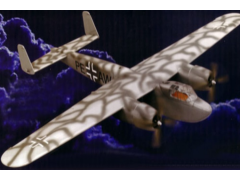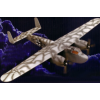Details
he following is a little history of the original development of this unique and handsome aircraft. The Dornier Do 217 was a later development of the original Do 17 series of bombers and reconnaissance aircraft. The prototype Do 17 first flew in 1938 and was not especially successful. Never-the-less development continued and early pre-production Do 217A-O's undertook a variety of clandestine photo-recon missions over the Soviet unio, prior to the German attack in 1941. Further development of the type produced the E-2 variant, originally conceived as a divebomber. However trials proved this unpractical and the E-2 was ultimately used for bombing raids over Great Britain and for antishipping missions over the North Sea and the Atlantic.
The Do 217J-1 variant was developed and used as a stopgap night fighter to counter the increasing number of bomber raids over Germany in 1942. Modified from the E-2, the J-1 had a solid, non-glazed nose, bristling with four 20mm cannons and four 7.9mm machine guns.
This brings us to Spring 1943, when the Do 217N-2R22 variant went into production as a dedicated and heavily armed night fighter. This aircraft retained the solid nose with the four cannon and four machine guns in place. But in addition, it also carried another four 20mm cannons mounted in the top of fuselage, behind the canopy. These weapons fired upwards at a 70O forward angle. This unusual armament system was used effectively against Allied bomber formations and was called "Schräge Musik". Later versions also included the Lichtenstein SN-2 radar system, with its unique antenna array on the fuselage nose.
The SIG Do 217 is strictly a sport scale model and not necessarily based on any particular variant. Instead, we leaned on both the J-1 and 2R22 night fighter versions of this airplane to create our own R/C version. If you desire, the SIG Do 217 lends itself to a lot of details that would look great on this model.
The recent and rapid development of super-efficient electric motors and certainly lithium polymer batteries have both served to make multi-engine models a very practical reality. Our prototype Do 217 models have proven to be outstanding R/C aircraft, both in terms of performance and looks. We've flown our own prototypes a great deal and can report to you for sure that they are solid flying models with surprisingly honest flying characteristics. When powered with a couple of appropriately sized brushless outrunner motors, swinging the recommended prop sizes, the airplane will have a wide speed range and should be capable of some very nice - although not necessarily scale - aerobatics. While the SIG Do 217 is a comfortable model to fly, we do not recommend it as a first R/C model. But we can and do highly recommend the Do 217 as your first semi-scale twin electric model!
This assembly manual will guide you through each construction phase in detail and is further enhanced with photos that visually assist you with each step. It is important that you follow the construction sequence carefully and accurately to achieve the best results.
Additional Information
Manufacturer: Sig
Specification
Kit Specifications: Imperial Metric
Wing Span 47 in. 1194 mm
Wing Area 324.6 sq. in. 20.9 dm2
Length 37.5 in. 953 mm
Flying Weight (typ) 30 - 35 oz. 850 - 990 g
Wing Loading 14.2 - 16 oz./sq. ft. 43.3 - 48.7 g/dm2
Motor (2 Required) 40 - 70 Watt Motors
Radio Equipment 4 Channels, (w/Mini Receiver & 3 or 4 Micro Servos)
Kit Number: SIGRC99
Glues - SIG Kwik-Set 5-Minute Epoxy, SIG-Bond Glue, SIG Thin, Medium and Thick CA Glue
Loctite® Non-Permanent Thread Locker
Hobby Knife with Sharp #11 Blades
SIG AeroKote® or AeroKote-Lite®
Covering Tools - Heat Gun, Iron, Trim Seal Tool
Power Drill and hand "pin" vise (for smaller diameter drill bits as needed)
An assortment of drill bits and/or a numbered drill index
Soldering Iron and solder - STA-BRITE® Silver Solder suggested
Building Board
Modelers "T" pins
Waxed Paper
Sandpaper - assorted grits
Selection of Pliers
Selection of Screwdrivers
Razor Blades
Tweezers





